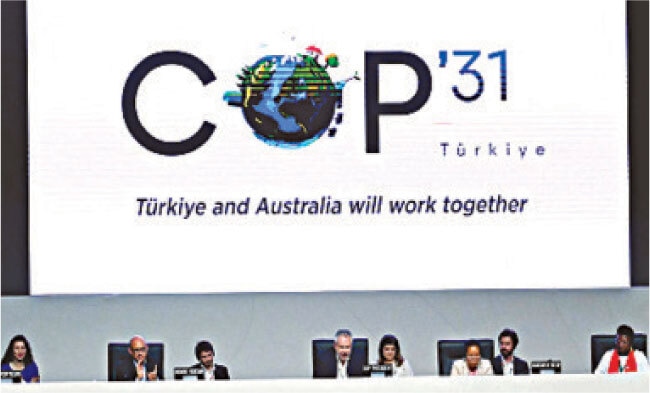• No mention of fossil fuel phase-out in final text
• Vague promises for adaptation fund prompt call for reform
• Multilateral process ‘being held hostage’, critics warn
THE script played out at COP30 in Belem was no different from that of previous climate conferences — some delegates left the venue with mixed feelings, while others were outright disappointed.
The conference, held in the Brazilian city on the edge of the Amazon, overran its schedule and ended on Saturday, a day after its planned close.
One of the outcomes at this so-called implementation COP was a cause for celebration, particularly the just transition mechanism “to enhance international cooperation, technical assistance, capacity-building and knowledge-sharing, and enable equitable, inclusive just transitions”.
This agreement, widely celebrated by civil society as a “historic victory for people power”, came after days of protests and intense negotiations.
“This outcome didn’t fall from the sky; it was carved out through struggle, persistence and the moral clarity of those living on the frontlines of climate breakdown,” said Tasneem Essop, executive director at the Climate Action Network International.
“Governments must now honour this Just Transition mechanism with real action. Anything less is a betrayal of people, and of the Paris (agreement) promise,” she said.
However, adaptation finance for vulnerable communities left much to be desired. The conference was supposed to reach an agreement to triple adaptation finance to $120 billion by 2030.
However, the ‘mutirao’ decision — a Portuguese term for “collective efforts” — calls for efforts to “at least triple adaptation finance by 2035” without setting a baseline target, a move that does not match the level of ambition demanded by the developing countries and the civil society groups.
“The refusal to commit to scaling up finance to the necessary $300 billion annually for adaptation leaves the unprepared defenceless against inevitable ruin,” said Harjeet Singh, strategic adviser at the Fossil Fuel Treaty Initiative.
“By failing on their past commitment to double adaptation finance (to $40 billion) by 2025 and keeping the baseline of the new target vague, developed nations have attempted to diluted their responsibility, forcing the world’s most vulnerable to face the rising waters with empty hands,” he said.
Fossil fuel phase-out
The worst outcome was the fossil fuel phase-out, which did not even get a mention in the COP agreement despite robust support from more than 80 countries.
Instead, the COP presidency announced that a roadmap to transition away from fossil fuels and halt deforestation would be presented at the next climate conference, ie COP31. The roadmap will be guided by a conference in Santa Marta in April to be co-hosted by Colombia and the Netherlands, according to Carbon Brief.
COP31 will be held in Turkiye, with Australia as its president.
According to CAN International, the decision to ignore the harmful impacts of fossil fuels was deeply disappointing. “Given that oil, coal and gas remain the root cause of climate breakdown, this omission represents a severe failure for COP30,” it said in a statement.
Tracy Carty of Greenpeace International said the negotiations were derailed by inadequate climate finance, weak leadership from G20 nations, particularly the developed ones, and the heavy hand of fossil fuel interests.
Like fossil fuels, the finance outcome was also dismal. In the absence of the US and the European Union’s focus on defence, it seems the responsibility for saving the planet has fallen to China and the developing world, said Dr Abid Suleri of the Islamabad-based Sustainable Development Policy Institute, about the reluctance of rich nations to pay for loss and damage.
Calls for reform
The presence of fossil fuel lobbyists and a dilute outcome also brought the wider UNFCCC process under scrutiny. Still, some hailed the mutirao text as a win for multilateralism.
“COP30 has proven that the current consensus model has become a veto for vandals. We are trying to put out a planetary fire, but the UN rules allow the arsonists — the petrostates and their 1,600 lobbyists — to stand in the doorway and block the fire trucks,” Mr Singh told Dawn.
He said the ‘consensus’ becomes a synonym for capitulation if a handful of countries, like Saudi Arabia and Russia, can simply erase the mention of the fossil fuel phase-out from the final text. “The multilateral process is alive, but it is being held hostage,” he added.
Erika Lennon, senior attorney at the Centre for International Environmental Law, also called for reforms in the UN process. “Petrostates and industry lobbyists use the consensus rule to block action and ambition. We now need to reform the UNFCCC so the global majority can act, starting with conflict of interest rules and allowing majority voting,” she said.
Dr Suleri agreed. He said the “polarised” conference ended in a compromise despite tall claims at the outset. “President Lula called COP30 the COP of truth; the truth, however, is hard to ignore. This COP still lacks both the money and the ambition needed to match the promises made at the start,” he added.
The conference also launched the Declaration on Information Integrity on Climate Change, which establishes shared international commitments to address climate disinformation and promote accurate, evidence-based information on climate issues.
This initiative aims to mobilise resources to fund research projects and investigative journalism ideas that can produce evidence in a coordinated manner, offering more inputs for better climate policies, said the Unesco Division for Digital Inclusion and Policies and Digital Transformation Director Guilherme Canela in an email to Dawn.
Published in Dawn, November 27th, 2025


